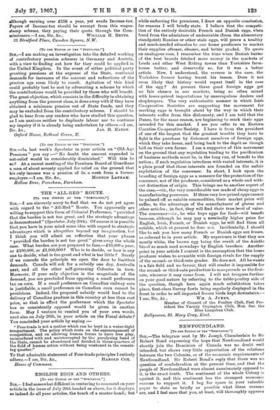ENGLISH EGGS AND OTHERS.
[TO THE EDITOR OF THE "SPECTATOR."]
SIR,—I feel somewhat diffident in venturing to comment on your article in the issue of July 20th headed as above, for it displays, as indeed do all your articles, the touch of a master-hand; bizt while endorsing the premisses, I draw an opposite conclusion, for reasons I will briefly state. I believe that the competi- tion of the entirely desirable French and Danish eggs, when freed from the admixture of undesirable (from the alimentary standpoint) Russian or other stale eggs, will prove a healthy and much-needed stimulus to our home producers to market their supplies oftener, cleaner, and better graded. To quote an analogous case, I remember the time when Danish butter of the beat brands fetched more money in the markets of Leeds and other West Riding towns than Yorkshire farm- house butter, and deservedly so, for it was a better article. Now, I understand, the reverse is the case, the Yorkshire farmer having learnt his lesson. Does it not seem likely that history would repeat itself in the case of the egg? At present these good foreign eggs get no fair chance in our markets, being so often mixed with lower-priced importations by unscrupulous dealers and shopkeepers. The very enthusiastic manner in which Irish Co-operative Societies are supporting the movement for marking eggs is brought about by the way in which that- interests suffer from this dishonesty, and I am told that the Danes, for the same reason, are beginning to mark their eggs intended for this market. I see you refer to an Eastern Counties Co-operative Society. I have it from the president of one of the largest that the greatest trouble they have to fight is the purchase by dishonest members of foreign eggs, which they take home, and bring back to the depot as though laid on their own farms. I am a supporter of this movement on the ground that any regulation tending to the purification of business methods must be, in the long run, of benefit to the nation ; if such regulation interferes with vested interests, it is a plain proof that those interests are founded on the unfair exploitation of the consumer. In short, I look upon the branding of foreign eggs as a measure for the protection of the consumer, not of the producer, considered as a whole and with- out distinction of origin. This brings me to another aspect of the case,—viz., the very considerable use made of cheap eggs in manufacturing processes. If these very low-priced eggs cannot be palmed off as eatable commodities, their market price will suffer, to the advantage of the manufacturer of gloves and other articles ; in fact, they will find their true level of value. The consumer—Le., he who buys eggs for food—will benefit because, although he may pay a nominally higher price for English, Irish, French, or Danish eggs, he will find them all eatable, which at present he does not. Incidentally, I should like to ask you how many French or Danish eggs are brown, as referred to in your article. My experience is that they are mostly white, the brown egg being the result of the Asiatic blood so much used nowadays by English breeders. Another point in your article I contest is the assumption that the home producer wishes to scramble with foreign rivals for the supply of the second- or third-rate grades. He does not. All he wants is a fair field and no favour, that will render it impossible for the second- or third-rate production to masquerade as the first- rate, wherever it may come from. I will not trespass further on your good nature by referring to the table-poultry side of the question, though here again much substitution takes place, first-class Surrey fowls being regularly displayed in the front in order to sell imported frozen birds kept downstairs.— Member of Council of the Poultry Club, Past Pre- sident the Variety Orpington Club, Hon. Sec. the Blue Langshan Club.
Ballymena, St. Mary Cray, Kent.






































 Previous page
Previous page